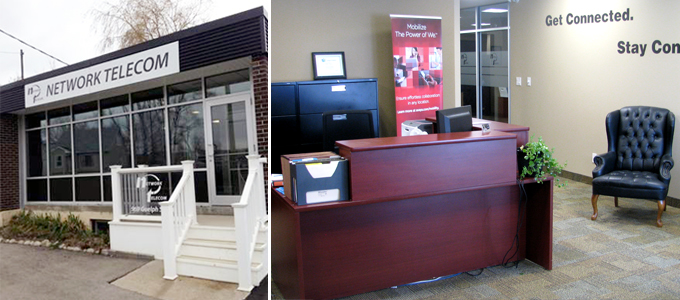Today we’re going to take a close look at a PBX phone system. We’ve been in the telecommunications industry for more than 40 years, and we’d love to share our expertise with you. This post will explain what PBX is, what types of systems are available, and where you can get support for your telecommunications system. So, let’s get started.
What Is a PBX Phone System
The acronym PBX stands for Private Branch Exchange and it refers to a business-grade phone system. There are a wide variety of PBX phone systems. Many systems today are digital instead of analog and use the internet to send voice and video communications.
For more in-depth learning about PBX and other telephone systems, check out this informative video
Difference Between PBX and a Residential Landline
A PBX system differs from a residential landline in a number of ways. A PBX phone system will have features that businesses require to connect people at work that residential and cell phones do not such as:
- Extensions for various individuals and departments in your facility
- Business hour settings for routing calls when the office is closed
- Customer waiting queues and interactive voice menus (IVR)
- On-hold music
- Call conferencing
- Voicemail and call recording
A PBX phone system also lets your business have more phones than physical phone lines and allows free calls between users in your organization.
Types of PBX Phone Systems: Pros and Cons
Traditional Analog PBX Phone System
A traditional analog PBX phone system uses analog phone lines. An analog phone line is the original telephone technology that converts air vibrations into an analogous electrical frequency. The frequency travels over Plain Old Telephone Service (POTS) lines. This type of phone line is more commonly referred to as a landline.

A traditional analog PBX phone system uses telephone lines to make calls
If you are using a traditional PBX phone system, then your phones and fax machine are physically connected to your PBX by copper wiring. Calls coming into your organization are routed through your PBX and directed to the appropriate phones in your facility. A PBX system is usually located in a telecom closet.
Advantages:
- Many businesses still use a traditional analog PBX system. If it is still working and meeting your needs, then you don’t have to invest in another newer system.
- Another advantage to an analog phone system is that it isn’t reliant on electricity. If the power goes off or if your network goes down, you can still have telephone access.
Disadvantages:
- You are limited to the number of outside phone lines, also called trunks. For example, if four people in your organization all want to make an outside call at the same time and you only have three outside lines, then one person will have to wait until a line becomes free in order to make their call.
- In addition, although you can have more internal phones and extensions to use, there is a maximum number of those you can have too.
A traditional PBX system is not able to give you some of the more modern phone system features that an IP PBX can such as voicemail-to-email.
IP PBX or VoIP PBX
An IP PBX uses the internet and digital signals instead of the traditional landlines and analog signals to make calls.
Here is a great explanation about the difference between digital and analog
Advantages:
- A great advantage of the IP PBX is that you can have virtually an unlimited number of extensions so you are not restricted when you need to increase the size of your system.
- IP PBX also allows you to have more complex features that would be very expensive if you had them implemented on a traditional system such as:
-
- Automated receptionist
- Reporting
- Ring groups
- Unlimited voicemail and voicemail to email
- Call transfers to a mobile device
Types of IP PBX Phone Systems: On Premise and Hosted
There are two ways that you can have an IP PBX for your business: On-Premise or Hosted.
On Premise IP PBX or VoIP PBX
An On Premise IP PBX is similar to a traditional PBX in that it is housed within your office, usually in a telecom closet. It just looks like a server with a number of wires attached to it. Instead of connecting your phones with copper wires like in the traditional PBX system, you connect over your local area network just like you would connect your computers.
Advantages:
- You can route all of your calls through your existing LAN (local area network) so you don’t need a separate network for your telecommunications.
- You will have lower monthly payments once you have made the initial purchase of your equipment. You will have more control over your system because you own it. It’s very easy to add extra lines to this types of system.
Disadvantages:
- In order to make outside calls, you will need Primary Rate Interfaces (PRIs) or SIP trunking service. This is a service that you buy that will connect on premise IP PBX to the Public Switched Telephone Network.
- You need to invest in an IP PBX server so your initial costs will be higher and you are responsible to maintain it. Training on the new system is your responsibility.
Learn more about Primary Rate Interface
Hosted PBX or “Cloud Phone System”
A hosted PBX also uses the internet to make calls, however, instead of you having your own IP PBX system located at your facility, you pay to connect to an IP PBX that is located on their premises instead of yours. Your service provider houses the IP PBX and looks after its maintenance and you simply connect to it through the internet. Your desk phones will be plugged into a router that will connect them to your service provider’s location.
Advantages:
- You have very little initial costs; you only need to buy your IP phones and maybe a router and network switch
- Any upgrades and maintenance costs are your service provider’s responsibility
- It’s very easy to add extra lines to this types of system
Disadvantages:
- You may have to upgrade your existing network in order to be able to handle the amount of calls that you make and to ensure call quality
- You need to pay a monthly fee for this service
Recommended PBX Brands

Network Telecom can recommend a PBX phone system that is right for you
There are several great telecommunication providers who offer quality PBX phone systems including:
If you want to have more control over your phone system and if you have the initial capital to invest upfront to enjoy savings down the road, then an On Premise PBX may be best for you.
If you don’t want to have a huge upfront investment or you don’t have room in your budget to invest in your own system, then choosing the Hosted PBX may be a better option for you.
If you are not sure, we can help. At Network Telecom, we can sit down with you to understand your particular needs and we can recommend a telecommunications solution that will best meet your situation and budget. Contact us today for a free consultation.
Where to Find a PBX Phone System Provider and Support in Kitchener/Waterloo
It is getting harder to find a telecommunications company that will support a PBX system. Don’t worry, Network Telecom can help. At Network Telecom we can recommend, install, and maintain any type of voice and data communication system your business has.
We have been in the telecommunications industry for over 40 years and our technicians are fully qualified and highly experienced to install and support any PBX or other telecommunications system that you own. You can call us 24/7/365 for technical support even if we didn’t initially install your system.
We also carry a large inventory for a quick response to parts and component issues. Whatever your telecommunication or networking issue, we can resolve it quickly and professionally.

Need a New PBX Phone System? Network Telecom Can Help
If you need to update your current business phone system, partner with Network Telecom. We will help you choose the best phone system for your business. Whether you are looking to have a new phone system installed or your current system updated, you can trust Network Telecom to offer you the expert advice you require.
We also provide a full range of voice mail solutions and voice mail support services. If you are looking for helpful advice about how you can improve your current voicemail system, talk to the professionals at Network Telecom. In addition, we can help you with video conferencing solutions that will meet your business’s particular needs.
In addition to our accredited and certified technical expertise, we offer:
- Consultative Sales
- Cloud Services
- Ongoing Support
- Voice Mail Systems
- System Design + Consulting
- System Admin + User Training
- PA Systems
- VoIP Specialist
- Network Cabling
“Very satisfied with the services we received from their staff. They came in and helped us with our phone and fax network cables. They were fast, knowledgeable and got the job done right in a matter of hours!”
– Healing 7 Generations
Contact us today for all of your telecommunication questions and concerns; we’d be happy to help you.

